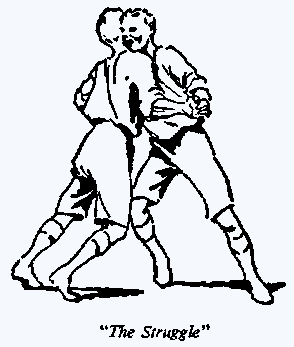ENDURANCE FOR SCOUTS
Gamp Fire Yarn No, 17
HOW TO GROW STRONG
Need for Scouts to be Strong • Exercises Care of Body
Nose • Ears •
Eyes Teeth • Nails • Practices
A SCOUT lay sick in hospital in India with that dangerous disease called cholera. The
doctor told the servant attending him that the only chance of saving his life was to warm up his feet and keep the blood moving
in his body by constantly rubbing him.
The moment the doctor's back was turned, the servant gave up rubbing and squatted down
to have a quiet smoke.
The poor patient, though he could not speak, understood all that was going on, and he
was so enraged at the conduct of the attendant that he resolved then and there that he would get well if only to give the
servant a lesson. Having made up his mind to get well he got well.
A Scout saying is "Never say die till you're dead"-and if he acts up to this, it will
pull him out of many a bad place when everything seems to be going wrong for him. It means a mixture of pluck, patience, and
strength, which we call "endurance".
A Sample of Endurance
The great South African hunter and scout, F. C. Selous, gave a good example of scouts'
endurance on a hunting expedition in
Barotseland, north of the Zambesi River, some years ago. In the middle of the night his
camp was suddenly attacked by a hostile tribe, that fired into it at close range and charged in.
He and his small party scattered at once into the darkness and hid themselves away in
the long grass. Selous himself had snatched up his rifle and a few cartridges and got safely into the grass. But he could
not find any of his men, and, seeing that the enemy had taken possession of his camp, and that there were still a few hours
of darkness before him in which to make his escape, he started off southward, using the stars of the Southern Cross as his
guide.
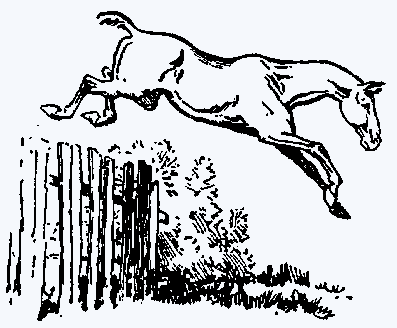
He crept past an outpost of the enemy whom he overheard talking, then swam across a river
and finally got well away, only dressed in a shirt, shorts, and shoes. For the next few days and nights he kept walking southward,
frequently hiding to avoid the enemy. He shot deer for food.
But one night, going into what he thought was a friendly village, he had his rifle stolen
from him, and was again a fugitive, without any means of protecting himself or of getting food. However, he was not one to
give in while there was a change of life left, and he pushed on and on till at length he reached a place where he met some
of his men who had also escaped. After further tramping they got safely back into friendly country.
But what a terrible time they must have had!
Three weeks had passed since the attack, and the great part of that time Selous had been
alone-hunted, starving, bitterly cold at night, and in sweltering heat by day.
None but a scout with extraordinary endurance could have lived through it, but then Selous
was a man who as a lad had made himself strong by care and exercise. And he kept up his pluck all the time.
It shows you that if you want to get through such adventures safely when you are a man
and not be a "slopper," you must train yourself to be strong, healthy, and active as a lad.
The Wrong Way to Endurance
A man told me recently with great pride that he was teaching his son endurance by making
him do long marches and bicycle runs. I told the man that he was likely to do just the opposite for his boy -that the way
for a lad to gain endurance was not by trying to perform feats, as these would very probably injure his heart and break him
down, but by making himself strong and healthy, by good feeding and moderate exercise, so that when he became a man and his
muscles were all "set" he could then go through hardships and strains where another weaker man would fail.
EXERCISES AND THEIR OBJECTS
There is a great deal of nonsense done in the way of bodily exercises -so many people
seem to think that their only object is to make huge muscle. But to make yourself strong and healthy it is necessary to begin
with your inside and to get the blood into good order and the heart to work well. That is the secret of the whole thing, and
exercises of the body do it for you. This is the way:
(a) MAKE THE HEART STRONG to pump the blood properly
to every part of the body, and
so to build up flesh, bone, and
muscle.
Exercise: "Wrist Pushing" and "The Struggle". See below.
(b) MAKE THE LUNGS STRONG to provide the blood with
fresh air.
Exercise: "Deep Breathing". See below.
(c) MAKE THE SKIN PERSPIRE to get rid of the dirt from
the blood.
Exercise: Bath, or dry rub with a damp towel every day.
(d) MAKE THE STOMACH WORK to feed the blood.
Exercise: "Cone", or "Body Bending", and "Twisting". See below.
(e) MAKE THE BOWELS ACTIVE to remove the remains of
food and dirt from the body.
Exercise: "Body Bending" and "Kneading the Abdomen". Drink plenty of good water. Regular
daily "rear".
(f) WORK MUSCLES IN EACH PART OF THE BODY to
make the blood circulate to that part,
and so increase your
strength.
Exercise: Running and Walking, and special exercises of special muscles, such as "Wrist
Pushing" (see below), etc.
The secret of keeping well and healthy is to keep your blood clean and active. These different
exercises will do that if you will use them every day.
The blood thrives on simple good food, plenty of exercise, plenty of fresh air, cleanliness
of the body both inside and out, and proper rest of body and mind at intervals.
SIX EXERCISES FOR HEALTH
It is possible for almost any boy, even though he may be small and weak, to make himself
into a strong and healthy man if he takes the trouble to do a few body exercises every day. They only take about ten minutes,
and do not require any kind of apparatus.
They should be practised every morning, the first thing on getting up, and every evening
before going to bed. It is best to do them with little or no clothing on, and in the open air, or close to an open window.
The value of these exercises is much increased if you think of the object of each move while you are doing it, and if you
are very particular to breathe the air in through your nose and to breathe out through your mouth.
Here are some good exercises. It strengthens the toes and feet to do them barefooted.
1. For Head and Neck-Rub the head, face, and neck firmly over several times with the palms
and fingers of both hands. Thumb the muscles of the neck and throat.
Brush your hair, clean your teeth, wash out your mouth and nose, drink a cup of cold water,
and then go on with the following exercises.
The movements should all be done as slowly as possible.
2. For Chest-From upright position bend to the front, arms stretched downwards, with back
of the hands together in front of the knees. Breathe out.
Raise the hands gradually over the head and lean back as far as possible, drawing a deep
breath through the nose as you do-that is, drinking God's air into your lungs and blood. Lower the arms gradually to the sides,
breathing out the word "Thanks" (to God) through the mouth.
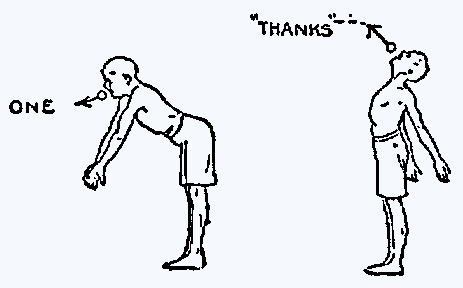
Lastly, bend forward again, breathing out the last bit of breath in you, and saying the
number of times you have done it, in order to keep count.
Repeat this exercise twelve times.
Remember while carrying it out that the object of the exercise is to develop shoulders,
chest, heart, and breathing apparatus inside you.
Deep breathing is important for bringing fresh air into the lungs to be put into the blood,
and for developing the size of the chest, but it should be done carefully, and not overdone. It is done by sucking air in
through the nose until it swells out your ribs as far as possible, especially at the back; then, after a pause, you breathe
out the air slowly and gradually through the mouth until you have not a scrap of air left in you, then after a pause draw
in your breath again through the nose as before.
Singing develops simultaneously proper breathing and development of heart, lungs, chest,
and throat, together with dramatic feeling in rendering the song.
3. For Stomach-Standing upright, send out both arms, fingers extended, straight to the
front, then slowly swing round to the right from the hips without moving the feet, and point the right arm as far round behind
you as you can, keeping both arms level with, or a little higher than, the shoulders. Then, after a pause, swing slowly round
as far as you can to the left. Repeat this a dozen times.
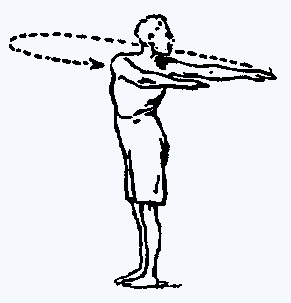
This exercise is to move the inside organs such as liver and intestines, and help their
work, as well as to strengthen the outside muscles round the ribs and stomach.
While carrying out this exercise, the breathing should be carefully regulated. Breathe
in through the nose (not through the mouth), while pointing to the right rear; breathe out through the mouth as you come round
and point to the left rear, and at the same time count aloud the number of the swing-or, what is better, thinking of it as
part of your morning prayer with God, say aloud: "Bless Tim", "Bless Father", and any of your family or friends in turn.
When you have done this six times to the right, change the breathing to the other side:
breathe in when pointing to the left rear, and breathe out to the right.
4. For Trunk-"Cone Exercise".-Standing at the "Alert", raise both hands as high as possible
over the head, and link fingers. Lean backwards, then sway the arms very slowly round in the direction of a cone, so that
the hands make a wide circle above and around
the body, the body turning from the hips, and leaning over to one side, then to the front,
then to the other side, and then back. This is to exercise the muscles of the waist and stomach.

Repeat, say, six times to either hand. With the eyes you should be trying to see all that
goes on behind you during the movement.
A meaning attached to this exercise, which you should think of while carrying it out,
is this. The clasping hands mean that you are knit together with friends-that is, other Scouts-all round you as you sway round
to the right, left, before, and behind you; in every direction you are bound to friends. Love and friendship are the gift
of God, so when you are making the upward move you look to heaven and drink in the air and the good feeling, which you then
breathe out to your comrades all round.
5. For Lower Body and Back of Legs-Like every one of the exercises, this is, at
the same time, a breathing exercise by which the lungs and heart are developed, and the blood made strong and healthy. You
simply stand up and reach as high as you can skywards, and backwards, and then bend forward and downward till your fingers
touch your toes, without bending your knees.
Stand with the feet slightly apart, touch your head with both hands, and look up into
the sky, leaning back as far as you can, as in Fig. 1 on page 186.
If you mingle prayer with your exercises, as I described to you
before, you can, while looking up in this way, say to God: "I am yours from top to toe",
and drink in God's air (through your nose, not through the mouth). Then reach both hands upwards as far as possible (Fig.
2), breathe out the number of the turn that you are doing, and bend slowly forward and downward, knees stiff, till you reach
your toes with your finger-tips (Fig. 3).

Tuck in the small of your back while on the downward bend.
Then, keeping arms and knees still stiff, gradually raise the body to the first position
again, and repeat the exercise a dozen times.
The object of this exercise is, however, not to touch the toes, but to massage the stomach.
If you find you cannot touch your toes do not force yourself to do it, and, more especially, do not jerk yourself or allow
anyone else to force you down. The value of the exercise lies in the upward stroke as against the downward stroke.
6. For Legs, Feet and Toes-Stand barefooted, at the position of "Alert". Put the hands
on the hips, stand on tip-toe, turn the knees outwards, and bend them slowly till you gradually sink down to a squatting position,
keeping the heels off the ground the whole time.
Then gradually raise the body and come to the first position again.
Repeat this a dozen times.
The small of the back must be tucked in. The breath should be drawn in through the nose
as the body rises, and counted out, through the mouth, as the body sinks. The weight of the body must be on the toes all the
time, and the knees turned outwards to make you balance more easily. While performing the practice you should remember
that its object is to strengthen the thighs, calves, and toe-sinews, as well as to exercise
the stomach, so if you practice it several times during the day, at any odd moments, it will do you all the more good.
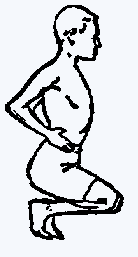
And you can connect with this exercise, since it makes you alternately stand up and squat
down, that whether you are standing or sitting, at work or resting, you will hold yourself together (as your hands on your
hips are doing), and make yourself do what is right.
These exercises are not merely intended as a way of passing time, but really to help a
fellow to grow big as well as to grow strong.
CLIMBING
Every boy likes climbing, and if you stick to it and become really good at it, you will
go on at it forever.
Most of the great mountain-climbers began as boys climbing up ropes and poles, and then
trees. After that, a long way after- because if you haven't had lots of practice and strengthened your muscles you probably
would tumble, and attend a funeral as the chief performer-you take up rock climbing, and so on to mountain climbing.
It is glorious sport teeming with adventure, but it needs strength in all your limbs,
pluck, determination, and endurance. But these all come with practice.
It is most important for mountain climbing to be able to keep your balance and to place
your feet nimbly and quickly where you want them. For this there is nothing like the game of "Walking the Plank" along a plank
set up on edge, or "stepping stones" laid about on the ground at varying distances and angles to each other.

When I was a fairly active young bounder I went in for the vigorous kind of folk dancing.
It amused people at our regimental theatricals and it was good exercise for me. But I came to realize a new value in it later
on when I had to carry out some scouting in service against the Matabele in South Africa.
I had climbed into their mountain fastnesses in the Matopo Hills and was discovered by
them. I had to run for it. Their great aim was to catch me alive as they wanted to give me something more special in the execution
line than a mere shot through the head-they had some form of unpleasant torture in view for me. So when I ran, I ran heartily.
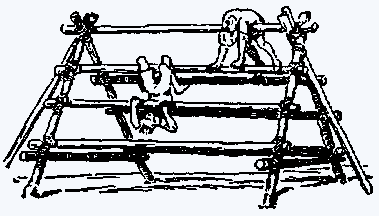
The mountain consisted largely of huge granite boulders piled one on another. My running
consisted mostly in leaping down from one boulder to another, and then it was that the balance and foot management gained
in folk dancing came to my aid. As I skipped down the mountain I found myself out-distancing my pursuers with the greatest
of ease. These, being plains men, did not understand rock-trotting and were laboriously slithering and clambering down the
boulders after me. So I got away. And with the confidence thus engendered, I paid many successful visits to the mountains
after this.
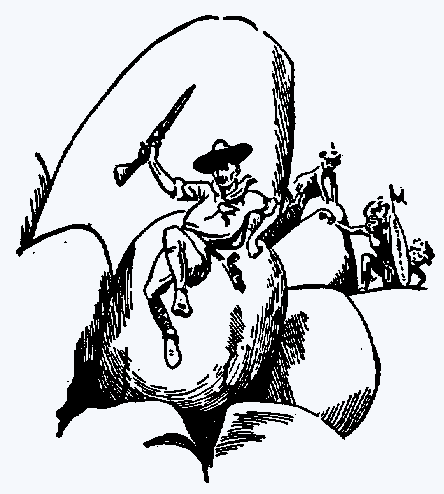
NOSE
A Scout must be able to smell well, in order to find his enemy by night. If he always
breathes through the nose, and not through the
mouth, this helps him considerably. But there are other reasons more important than that
for always breathing through the nose. An American once wrote a book called Shut your Mouth and Save your Life, and he showed
how the Red Indians for a long time had adopted that method with their children to the extent of tying up their jaws at night,
to ensure their breathing through the nose only.
Breathing through the nose prevents many disease germs from getting from the air into
the throat and lungs.
For a Scout, nose-breathing is also specially useful. By keeping the mouth shut you prevent
yourself from getting thirsty when you are doing hard work. And also at night, breathing through the nose prevents snoring,
and snoring is a dangerous thing if you are sleeping anywhere in enemy country. Therefore practise keeping your mouth shut
and breathing through your nose at all times.
EARS
A Scout must be able to hear well. Generally the ears are very delicate, and if they are
once damaged you may become incurably deaf.
People are too apt to fiddle about with their ears in cleaning them, by putting the corners
of handkerchiefs, hairpins, and so on into them, and also stuffing them up with hard cotton wool. All of this is dangerous
because the drum of the ear is a very sensitive tightly-stretched skin which is easily damaged. Many children have had the
drums of their ears permanently injured by getting a box on the ear.
EYES
A Scout, of course, must have particularly good eyesight-he must be able to see a long
way off. By practising your eyes in looking at things at a great distance, they will grow stronger. While you are young you
should save your eyes as much as possible. Avoid reading by poor light, and sit with your side to the light when doing any
work during the day. If you sit facing the light it strains your eyes.
Eye strain is a common failure with growing boys, although very often they do not know
it. Headaches come frequently from the eyes being strained. If a boy frowns, it is generally a sign of eye strain.
A Scout, besides having good eyesight, must be able to tell the colour of things which
he sees. Colour blindness is a trouble from which some boys suffer. It takes away a pleasure from them, and it
makes them almost useless for certain trades and professions. For instance, a railway
signalman or engine-driver or a sailor would not be much good if he couldn't tell the difference between red and green.
It can sometimes be overcome. A way of doing this, if you find you are rather colour blind,
is to get a collection of little bits of wool, or paper, of different colours, and pick out which you think is red, blue,
yellow, green, and so on, and then get someone to tell you where you were right and where wrong. Then go at it again, and
in time you will find yourself improving, until you have no difficulty in recognizing the colours.
TEETH
A would-be recruit came up to an Army recruiting officer to be enlisted. He was found
to be a sufficiently strong and well-made man, but when the doctors examined his teeth they found that these were
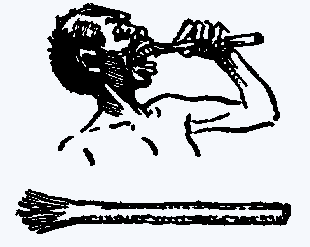
in bad condition, and he was told that he could not be accepted as a soldier. To this
he replied: "But, sir, that seems hard lines. Surely we don't have to eat the enemy when we've killed them, do we ?"
Good teeth depend upon how much you look after them when you are young, which means that
you should keep them carefully clean. Brush them at least twice a day-when you get up in the morning and when you go to bed,
both inside and out, with a tooth-brush and tooth paste. Rinse them with water, if possible, after every meal.
Scouts in the jungle cannot always find tooth-brushes, but they make substitutes out of
dry sticks, which they fray out at the end, and make an imitation of a brush.
NAILS
Soldiers, as well as other people, often suffer great pain and lameness from the nail
of their big toe growing down into the toe at the side. This is generally caused by permitting the nail to grow too long,
until by pressure of the shoe it is driven to grow sideways into the toe. So every Scout will be careful to cut his toenails
frequently, every week or ten days. They should be cut square across the top, not rounded, and with sharp scissors.
Finger-nails should also be cut about once a week with sharp scissors, to keep them in
good order. Biting the nails is not good for them.
PATROL PRACTICES IN HEALTH
Example will teach much-not just the Patrol Leader's personal actions but the example
given by having open windows when meeting indoors, and open tent doors when camping.
Health can best be taught in camp where there is time and opportunity to give close attention
to cleanliness and sound habits.
In camp, remember the importance of rest and plenty of sound sleep. There should be an
hour's rest after the main meal.
Teach the six exercises given in the Yarn, but don't use them as a drill. Encourage the
Scouts to do them daily.
Give each Scout a card on which he can keep a record of his physical measurements. Make
arrangements for these measurements to be taken every three months.
GAMES TO DEVELOP STRENGTH
Boxing, wrestling, rowing, swimming, skipping, cock-fighting, are all valuable health
aids to developing strength, but climbing is best of all.
Wrist Pushing
Stand with both your arms to the front about level with the waist, cross your wrists so
that one hand has knuckles up, the other knuckles down. Clench the fists.
Now make the lower hand press upwards and make the upper hand press downwards.
Press as hard as you can with both wrists gradually, and only after great resistance let
the lower push the upper one upwards till opposite your forehead, then let the upper press the lower down, the lower one resisting
all the time.
These two exercises, although they sound small and simple, develop most muscles in your
body if carried out with all your might. They should not be carried on too long at a time, but should be done at frequent
intervals during the day for a minute or so.
Wrist Pushing by Two Boys
Two boys face each other. Each puts out the wrist nearest to his opponent, at arm's length,
presses it against the other's wrist, and tries to turn him round backwards.
Staff Tossing
With your right hand grasp your staff near the butt and hold it upright. Then toss it
straight up in the air a short distance at first, and catch it with the left hand near the butt as it comes down. Toss it
straight up again with the left and catch it with the right, and so on, till you can do it one hundred times without dropping
it.
Follow the Leader
The leader goes ahead, doing different exercises. The others follow him, doing everything
he does.
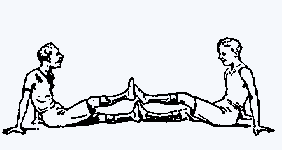
The Struggle
Two players face each other about a yard apart, stretch arms out sideways, lock fingers
of both hands, and lean towards each other till their chests touch, push chest to chest and see who can drive the other back
to the wall of the room or on to a goal line.
